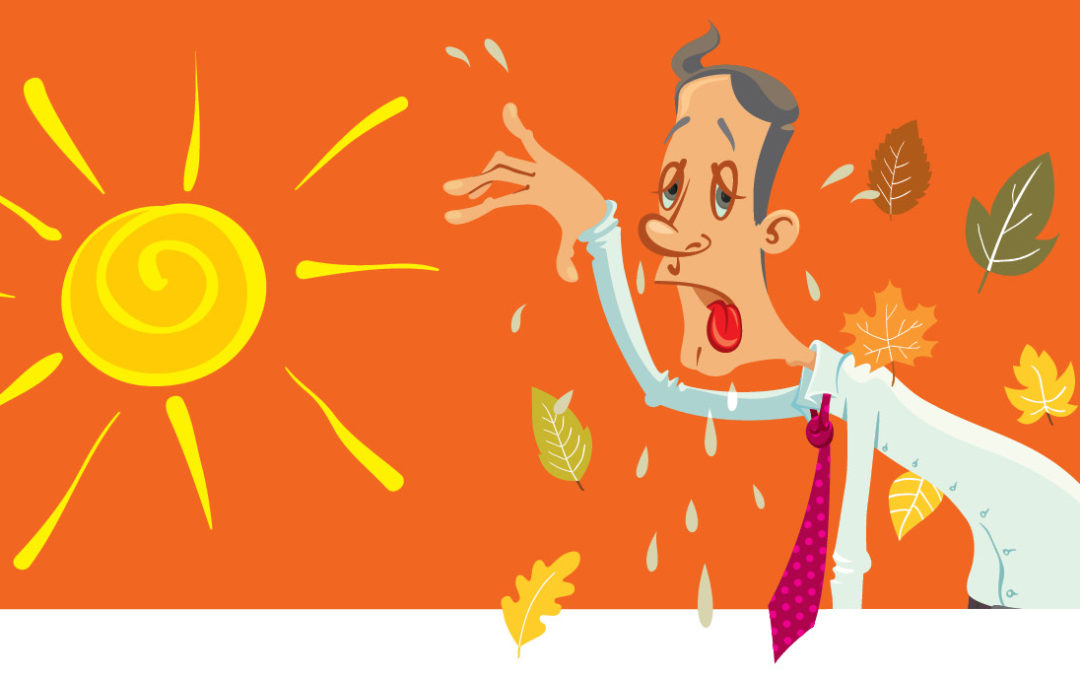September Heat Wave Liquifies Students, Teacher
Blink and summer vacation is over. The poor teachers like me who postpone work on our lesson plans and syllabi because, hey, we have the entire summer to get them done, always pay for that mistake when autumn suddenly arrives. Panic ensues as we scurry to get everything on our to-do lists done before heading back to work.
To buy a little extra time, I once proposed a new rhyme for remembering how many days are in a month: Thirty days hath September, April, June, and November. All the rest have 26 except . . . yippee! . . . August, which has 63.
The math works out, but, alas, changing the official calendar is not so easy. August remains as short and stressful as ever. A teacher in Massachusetts once described how the whole month of August always feels like “One long Sunday night.”
It’s strange how a teacher’s calendar is a backward mirror image of nature’s own. In autumn, everything in nature ends. Leaves fall, the wind bites, grass frosts and dies. But for teachers and students, the autumn marks the start of a fresh new year. Reinvigorated by our summer hibernation, we leap into a bustling season of lesson prep and new classes, while at the same time bears yawn and prepare to snooze for the winter. Still, sometimes the calendar changes but the summerlike weather does not, at least not right away.
Late last night, I was doing homework when a sudden tremor shook the floorboards. I felt more than heard the vibration. My eyes darted to the black window but saw nothing. Then . . . thud. Boom. Whump. Another distant tremor rattled the pane. Those first, distant thumps of an approaching thunderstorm sounded exactly like the T. rex’s footfalls in Jurassic Park.
Moments later, when the sky sizzled and erupted with yellow zigzags like Thor throwing a tantrum, all I could think was, “Boy, what a letdown.” Even the most amazing lightning displays are a disappointment when you’re expecting dinosaurs.
Today, back at school during a record-breaking September heat wave, I would welcome another thunderstorm, or even a dinosaur attack. Either one would put us out of our misery.
If the air gets any hotter we won’t need to open the classroom windows because the glass will melt. I’m half liquefied as it is, before I even get to my desk, and so are the students. Sweat drips off foreheads and blots the pages of open notebooks. One student snaps her book shut and uses the cover to fan her face.
“We should take a field trip to the library,” another student announces, oozing into his seat. The library, unlike our classroom, has air conditioning. I stagger to my feet and shove open another window instead. No breeze rewards my effort. Even with all the windows open, the room bakes us like a kiln. “Let’s get out of here,” I say. “If the breeze won’t come in, we’ll go find it.”
Today would be a good day for a field trip to the ocean, if only it were closer. We barely make it as far as the picnic tables under the pine trees, about 23 steps from the door. In the shade, I close my eyes and think of the sea and the many pleasant things it gifts to us. Cool breezes wafting onto shore. Whales splashing. Icebergs.
I torment myself with these thoughts because the shade by the picnic tables provides little comfort. The pine needles, dry and brittle in the heat, crunch under our feet. There isn’t even a good puddle to splash in.
“I’m going to take my shoes off because my feet are getting hot,” someone says. “Hope you can’t smell them from there.” We can.
Class soon ends, but the heat wave does not. Back in my office, sweat drips off my hand onto the homework I’m trying to correct. Well, I had wanted summer to last a little longer. I guess that’s why they say, “Be careful what you wish for.”
Okay, that does it. Time to act and put some knowledge from long-ago science classes to use. I’m going to keep walking across the carpet in socks until enough electricity gets generated to create a thunderstorm, which will cause downdrafts, which will cool us all off by sucking down huge quantities of refreshingly cold air from the upper troposphere.
Ow. Ow. Ow.
This may take a while.


 View Print Edition
View Print Edition